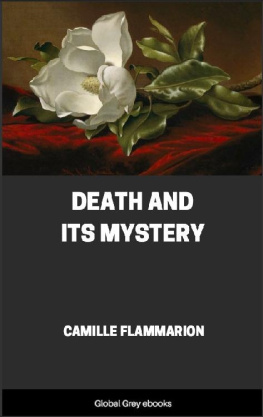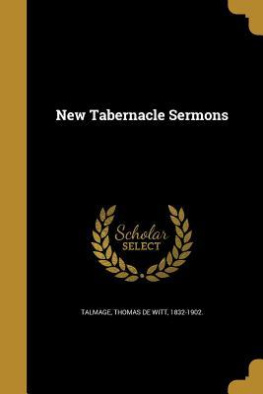DEATH AND ITS MYSTERY
BEFORE DEATH
VOLUME I
PROOFS OF THE EXISTENCE OF THE SOUL
BY
CAMILLE FLAMMARION
1922
Death and its Mystery By Camille Flammarion.
This edition was created and published by Global Grey
GlobalGrey 2018

globalgreyebooks.com
Contents
Chapter 1. The Greatest Of Problems Can It Actually Be Solved?
To be or not to be.
SHAKESPEARE.
ALTHOUGH I am not yet entirely satisfied with it, I have decided to offer today, to the attention of thinking men, a work begun more than half a century ago. The method of scientific experiment, which is the only method of value in the search for truth, lays requirements upon us that we cannot and ought not to avoid. The grave problem considered in this treatise is the most complex of all problems and concerns the general construction of the universe as well as of the human being that microcosm of the great whole. In the days of our youth we begin these endless researches because we are full of confidence and see a long life stretching out before us. But the longest life passes, with its lights and shadows, like a dream. If we may form one wish in the course of this existence, it is to have been in some way of service to the slow but none the less real progress of humanity, that fantastic race, credulous and skeptical, virtuous and criminal, indifferent and curious, good and wicked, as well as incoherent and ignorant as a whole barely out of the chrysalis wrappings of its animal state.
When the first edition of my book La Pluralit des Mondes habites were published (1862-64), a certain number of readers seemed to expect the natural sequel: La Pluralit des existences de lame. If the first problem has been considered solved by my succeeding books (Astronomie populaire, La Planete Mars, Uranie, Stella, Reves etoiles, etc.), the second has remained as open question, and the survival of the soul, either in space or on other worlds or through earthly reincarnations, still confronts us as the most formidable of problems.
A thinking atom, borne on a material atom across the boundless space of the Milky Way, man may well ask himself if he is as insignificant in soul as he is in body, if the law of progress can raise him in an indefinite ascent, and if there is a system of order in the moral world that is harmoniously associated with the order of the physical world.
Is not spirit superior to matter? What is our true nature? What is our future destiny? Are we merely ephemeral flames shining an instant to be forever extinguished? Shall we never see again those whom we have loved and who have gone before us into the Great Beyond? Are such separations eternal? Does everything in us die? If something remains, what becomes of this imponderable element invisible, intangible, but conscious which must constitute our lasting personality? Will it endure for long? Will it endure forever?
To be or not to be? Such is the great, the eternal question asked by all the philosophers, the thinkers, the seekers of all times and all creeds. Is death an end or a transformation? Do there exists proofs, evidences of survival of the human being after the destruction of the living organism? Until today the subject has remained outside the field of scientific observation. Is it possible to approach it by the principles of experimentation to which humanity owes all the progress that has been realized by science? Is the attempt logical? Are we not face to face with the mysteries of an invisible world that is different from that which lies before our senses and which cannot be penetrated by our methods of positive investigation? May we not essay, seek to find whether or not certain facts, if carefully and correctly observed, are susceptible of being scientifically analyzed and accepted as real by the severest criticism? We want no more fine words, no more metaphysics. Facts! Facts!
It is a question of our fate, our destiny, our personal future, our very existence.
It is not cold reason alone that demands an answer; it is not only the mind; it is our longings, our heart also.
It is childish and may appear conceited to bring ones own self upon the scene, but it is sometimes difficult to refrain from doing so; and as I have undertaken these laborious researches primarily in order to answer the questions of sorrowing hearts it seems to me that the most logical preface to this book will be furnished by some of those innumerable confidential communications which have reached me during more than half a century, begging with anguish for the solution of the mystery.
Those who have never lost by death some one deeply loved have never sounded the depths of despair, have never bruised themselves against the closed door of the tomb. We seek, and an impenetrable wall rises inexorably before the terror that confronts us. I have received hundreds of earnest appeals that I should have liked to answer. Should I make these confidences known? I have hesitated a long time. But there are so many of them, they reflect so faithfully the intense desire that exists to reach a solution, that it has now become a matter of general interest and my duty is clear. These expressions of feeling are the natural introduction to this work, for it is they that have decided me to write it. Nevertheless, I must apologize for reproducing these pages without alteration; for if they reveal the very souls of their sensitive authors, they also express themselves about me in terms of praise that it might well seem immodest on my part to publish. But this is only a personal detail, and consequently insignificant, especially as an astronomer, who realizes that he is an atom before the infinite and eternal universe, is inaccessible to and hermetically sealed against feelings of worldly vanity. Those who know me have considered me for many long years. My absolute indifference to all honors has abundantly proved this true. Whether I am considered great or insignificant, whether I am praised or criticized, I remain the distant spectator.
The following letter was written me by a distracted mother and has been reproduced literally. It shows how well worth while it would be at least to attempt to relieve suffering humanity. It is more than the science of doctoring the body, it is the science of healing the soul that must be created.
To Our Great Flammarion
Reinosa, Spain, March 30, 1907.
Monsieur:
I wish I might cling to your knees and kiss your feet while I beseech you to hear me and not reject my prayer. I cannot, I know not how to express myself. I wish I might arouse your pity, might interest you in my grief, but I should have to see you, to tell you myself of my own unhappiness, to paint the horror of what is passing in my soul, and then you could not deny me an immense compassion. What I have had to suffer before I could bring myself to commit this act of daring and indiscretion that resembles madness! Whence came the idea of addressing myself to our illustrious Flammarion, of asking him to console an unknown person who has no other claim upon his kindness than that of a fellow-countrywoman? It is because I am suffering! I have just lost a son, an only son. I am a widow and my only happiness consisted in this son and one daughter. Monsieur Flammarion, you would have had to know the beloved child I have just lost, to understand. I should have to tell you the story of the thirty-three years of his existence: then you would understand.
When at five years of age he was given up by all the celebrated physicians of Paris and Madrid, because of hip trouble, my poor husband and I sacrificed a brilliant position at Madrid and buried ourselves in a lonely country district in Spain in order to save this little boy who was the object of our devotion. For eight years he was ill and he was left lame! What he cost me in anxiety, care, sorrow, sleepless nights, anguish, and sacrifices it would be impossible to explain. But how dear and lovable he was! Brought up in a little carriage, petted and caressed, he was the most adorable child one could imagine. Oh, that childhood! How I wish I could get it back! At twelve years of age he no longer suffered from his leg, but he could not walk without crutches. What a grief this was to me, who had brought him into the world strong and well made! Later, at seventeen, he walked with only one crutch and a cane. At twenty, he was as handsome a lad as could be seen anywhere. If I dared, I would send you his photograph, so that you might see that my mothers love exaggerates nothing. Everyone felt his charm; he had that gift of pleasing which can be neither defined nor explained. Men, women, children, old and young were charmed by I know not what that radiated from his person. Wherever I went with him, I was congratulated on the beauty and goodness of my son. People envied him. Ah! That was because he was as beautiful as he was good! His soul was all nobility, grandeur, generosity. Intelligent and spiritual, even-tempered and sweet in his disposition as he was, life with him was a heavenly dream, a continual enchantment. You will realize what this meant, Monsieur, when I tell you that at twenty he developed cystitis, which was certainly a return of the first trouble in his leg, and that this cystitis was the beginning of a whole chain of suffering of which only hell could give you any idea. I cannot understand how God, our Creator, can permit the human body to be so martyrized. Above all, when this martyrdom is inflicted on a good and innocent being like my son. All the great specialists were consulted again, but alas! none of them was able to cure him. He spent thirteen years alternating between periods of better and worse, preserving, in the midst of the most atrocious suffering, his sweetness, his goodness and even his gaiety, so as not to sadden others.
Next page



